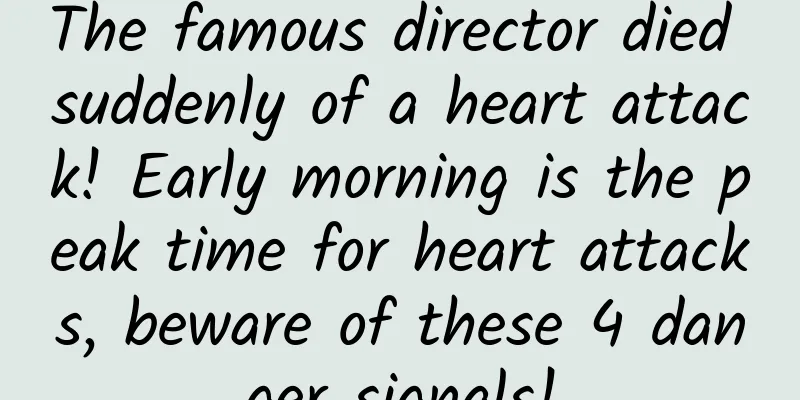The famous director died suddenly of a heart attack! Early morning is the peak time for heart attacks, beware of these 4 danger signals!

|
According to Tibet Daily, on May 8, the famous director Wangma Caidan passed away at the age of 54 due to ineffective treatment of heart disease. Wangma Caidan is a famous director, screenwriter, writer and producer in my country. He was born in Hainan Tibetan Autonomous Prefecture, Qinghai Province in 1969. He started directing films in 2002. His major films include Silent Mani Stone, Searching for Zhimei Gendeng, Old Dog, Talo, Killing a Sheep and Balloon. According to the Beijing News, it was learned from the Langkazi County People's Hospital in Tibet and the People's Hospital of the Tibet Autonomous Region that at around 3 a.m. and 7 a.m. on May 8, Wangma Caidan received emergency treatment in these two hospitals respectively, but died after the rescue efforts failed. 01 Early morning is a dangerous time... Early morning and when you wake up in the morning are also dangerous times for cardiovascular disease. According to "Analysis and Prevention of Sudden Events in Heart Disease Patients at Night", clinical practice has found that sudden death is most common between 00:00 and 07:00. Many heart diseases, such as acute myocardial infarction, various types of arrhythmias, and heart failure, can cause sudden cardiac death. Due to hypercoagulation of blood or contraction of coronary arteries during this period in the early morning, coupled with changes in autonomic nervous activity and endothelial dysfunction, coronary artery spasm is aggravated. At the same time, vagus nerve tension increases at night, leading to worsened myocardial ischemia and hypoxia and inducing sudden death. Copyright image, no permission to reprint 02 Poor heart Pay attention to these 4 signs Zhang Shiwen, attending physician of the Department of Cardiology at the Affiliated Hospital of Xuzhou Medical University in Jiangsu Province, reminds you that if you have a bad heart, please be alert to these four signs at night. 1. Severe chest pain If you have a bad heart and suddenly have severe chest pain at night, or severe chest tightness and sweating that lasts for a long time, and is not significantly relieved by medication such as nitroglycerin or quick-acting heart-saving pills, you must be alert, as this may be a manifestation of severe myocardial ischemia or even myocardial infarction. 2. Sudden awakening If you suddenly wake up from sleep and have to sit up to feel a little better, especially if you are coughing and coughing up pink sputum, this may be a sign of heart failure and you must see a doctor as soon as possible. 3. Heart palpitations Night is also a high-incidence time for atrial fibrillation. Its main symptoms are panic, irregular heartbeats, and a very irregular pulse. Copyright image, no permission to reprint 4. Insomnia If you have a bad heart and suddenly suffer from insomnia, you should also be alert. It is best to measure your blood pressure and heart rate. High blood pressure, fast heart rate and insomnia are all manifestations of sympathetic nerve excitement, and may also be a precursor to other heart problems. 03 Protect your heart 8 Things to Remember 1. Be gentle when you wake up in the morning When people wake up from a "semi-sleeping" state, their breathing and heartbeat speed up, and blood flow speeds up, which can easily cause aging cardiovascular and cerebrovascular ruptures. It is recommended to move your limbs in bed in the morning and then sit up slowly. 2. Drink a few sips of water after waking up Drinking a glass of warm water after waking up in the morning can appropriately dilute blood viscosity and reduce the risk of myocardial infarction. Don't drink too much water at one time. It is recommended to drink it in small sips and multiple times. For people with poor heart, a large amount of water will quickly dilute the blood, increase the blood volume, and increase the burden on the heart. Copyright image, no permission to reprint 3. Exercise in the sun Exercise after the sun comes out and the temperature rises to avoid sudden stimulation of blood vessels by low temperature and reduce the occurrence of myocardial infarction. 4. Don’t exceed the heart rate limit during exercise Only by persisting in exercise can you ensure good cardiopulmonary function. When exercising, it is recommended that the average person's heart rate should be 60% to 80% of the maximum heart rate (maximum heart rate: 220-age). 5. Eat “three mores and three lesses” It is recommended to eat more whole grains, fruits and vegetables, and fungi; eat less high-salt foods, sugary drinks, and red meat. Whole grains and cereals should account for one-third of the staple food in an adult's daily diet; eat one pound of fruit and half a pound of vegetables every day; eat more mushrooms, fungus, and other fungi. 6. Eat until you are 80% full Too much food, especially high-protein, high-fat food, is difficult to digest, causing abdominal distension and discomfort, raising the position of the diaphragm, restricting the normal contraction and relaxation of the heart, and increasing the burden on the heart. Copyright image, no permission to reprint 7. Go to bed early Lack of sleep increases the risk of cardiovascular disease. It is best to go to bed before 23:00 at night. If you have a lot of things to do the next day, you can get up earlier, but don't stay up late. 8. Take a half-hour nap at noon If you can rest for 20 to 30 minutes at noon, your heart muscle can be "nourished" and your heart rate can be more stable. Source: Health Times Review: Li Nannan Director of Hunan Science Writers Association Deputy Director of Research and Publicity Department of Hunan Science and Technology Association Second-level Researcher Chinese Science Writer (Medical) The cover image and the images in this article are from the copyright library Reproduction of image content is not authorized |
<<: The more sleep the better? How do you sleep at this age?
Recommend
Normal early pregnancy secretion pictures
The appearance of brown secretions in early pregn...
Why are clothes prone to static electricity in winter? What should I do if my clothes have static electricity in winter?
In daily life, we often encounter this phenomenon...
Is it normal to have a lot of blood clots during menstruation?
Many friends do not know whether it is normal to ...
Treatment and care of children's colds
1. What is a cold? Children often catch colds at ...
How to calculate the pregnancy period
When women learn that they are pregnant, the burd...
How should women with anemia be treated with diet?
Since women lose blood regularly during their men...
A picture of a woman's vaginal discharge
Nowadays, the influence of women in daily life co...
How to exercise in late pregnancy to help you have a normal birth
I believe that many women are afraid of childbirt...
What causes dizziness before menstruation?
Women may have some physical reactions before the...
How to practice postpartum slimming yoga
Women are often weak after giving birth. In order...
Why women don't get pregnant
Some people want to get pregnant but can't, w...
Causes of abdominal pain during ovulation
Children are the fruit of love, and a family is c...
Will a woman of stone have menstruation?
Stone women refer to women who are born without v...
Can I test for pregnancy if my period is delayed for two days?
Women who have sex and have delayed their menstru...
Why does my menstrual flow decrease? These 6 reasons are most likely
When the menstrual flow decreases, female friends...









